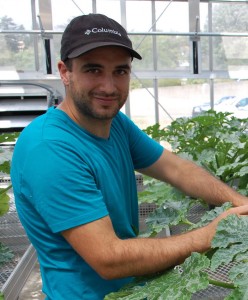Christine Smart
Principal Investigator
Professor
My program has the goal of developing improved management strategies for vegetable diseases by increasing our understanding of pathogen biology and diversity under field conditions. Using this information, we provide growers with novel disease management options. Areas of research and extension emphasis: 1) Vegetable pathology and disease control specializing in bacterial and oomycete pathogens; 2) Population structure and diversity of oomycete and bacterial plant pathogens; 3) Detection and identification of vegetable pathogens; 4) Elementary school science education outreach.
Chase Crowell
Graduate Student
Willow rust is a devastating disease of shrub willow (Salix spp.), causing up to 50% yield losses to susceptible cultivars and greatly affecting the promise of willow as a SRC (short rotation coppice) bioenergy crop. The disease is caused by three distinct taxa: The Larix-alternating group M. paradoxa, the Abies-alternating group M. americana, and the Ribes-alternating paraphyletic clade yet to be deciphered. I am working on exploring the degree of diversity within these taxa throughout the Northeast, with the goal of more effective disease management, and development of more resistant cultivar. I am also looking at fundamental molecular processes of these complex obligate biotrophs through comparative genomics with other Melampsora rust pathogens.
 Chris Peritore
Chris Peritore
Graduate Student
I am interested in understanding what makes the causal agent of bacterial canker of tomato, Clavibacter michiganensis subsp. michiganensis, such a successful pathogen. This Gram-positive bacterium causes severe wilt and canker formations by colonizing the vascular tissue. One of the aims of my research is to understand if it is intracellular, how it may be entering, and how it has adapted to this lifestyle. I am also working on the horizontally acquired expansin genes that play a significant role in disease progression and with USDA collaborators to build a high-quality proteome for reannotation and validation of the genome, while also understanding the post-translational modifications of serine proteases under different conditions.
 Greg Vogel
Greg Vogel
Graduate Student
I am interested in improving the control of the broad host range oomycete plant pathogen Phytophthora capsici. No sources of complete resistance to the pathogen have been identified in Cucurbita pepo (zucchini, pumpkin, summer squash), but there is genetic variation for susceptibility. One of my goals is to identify the loci that contribute to this variation. I am also working on furthering our understanding of how isolated field populations of the pathogen evolve.
 Martha Sudermann
Martha Sudermann
Graduate Student
I am currently studying Phytophthora infestans, the pathogen responsible for late blight in tomatoes and potatoes. I am investigating effector diversity within an asexual clonal lineage of Phytophthora infestans to understand better how rapidly the pathogen will evolve to overcome host resistance. This is a continuation of previous work in our lab that used GBS (Genotyping-By-Sequencing) to understand diversity within clonal lineages of Phytophthora infestans.
 Ali Cala
Ali Cala
Graduate Student
Industrial hemp is a recently reintroduced crop to New York State. Since its reintroduction, several pathogens have emerged as possible threats to production, including powdery mildew, a fungal disease caused by Golovinomyces spadiceous. The fungus appears as patches of white spores on the surface of leaves and can lead to early leaf drop and reduced flower bud quality. I am interested in understanding the diversity of powdery mildew isolates in New York State and throughout the United States, as well as whether any host resistance exists within the germplasm of the Cornell hemp breeding program. I am also interested in determining whether pathogen infection can impact the production of volatiles and secondary metabolites in hemp.
 Juan Luis Gonzalez-Giron
Juan Luis Gonzalez-Giron
Graduate Student
My interests in the Smart lab follow two directions: plant-microbe interactions, and international agriculture. I study bacterial spot of tomato and pepper, an economically significant disease for these crops. The causal agent is attributed to a complex of four Xanthomonas species that share the same host niche, but differ in their regional distributions following a latitudinal gradient. I am currently studying the population dynamics of Xanthomonas cynarae pv. gardneri, the spot-causing pathogen in the North-Eastern United States and Canada, with an emphasis in isolates from New York State. I aim to increase our understanding of how this pathogen spreads in the area, and how some of its effectors interact with the host. I am also studying how can we translate Climate Smart Agriculture policies from Southern Asia into a Latin American context.
 Colin Day
Colin Day
Lab Manager


